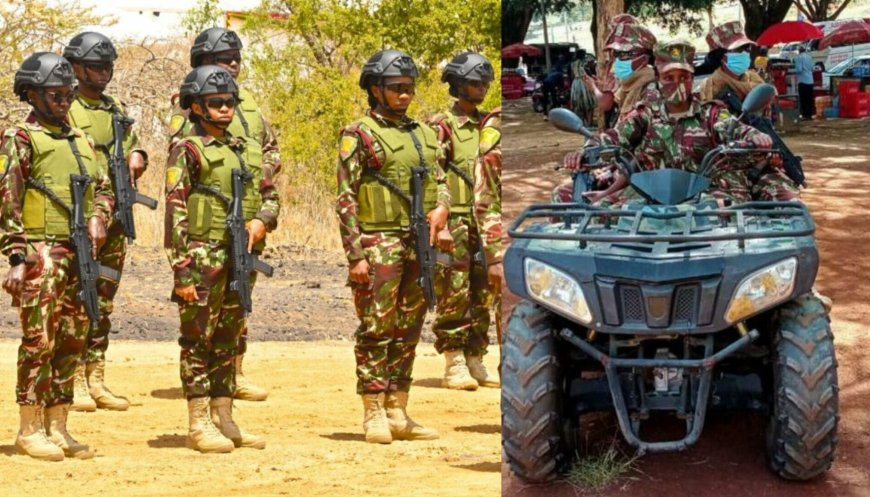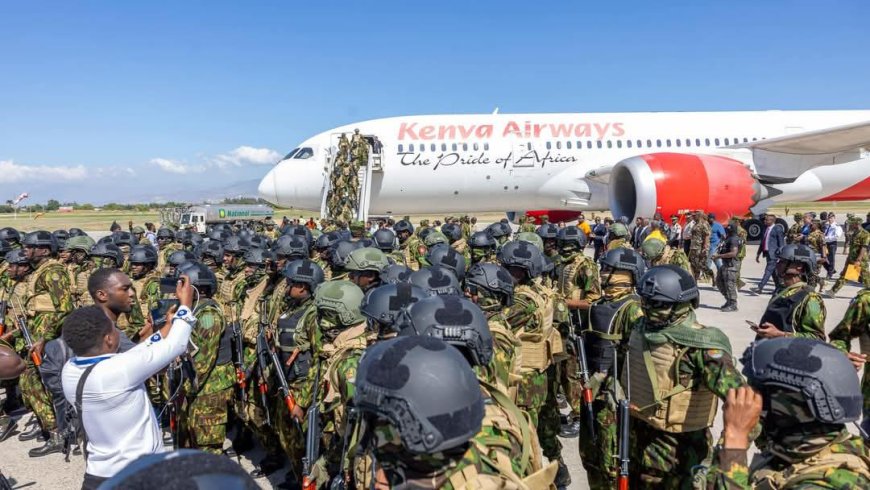According to the Ministry of Interior, the government will also deploy officers from the General Service Unit (GSU) and the Anti-Stock Theft Unit (ASTU) alongside the female officers.
On Saturday, January 18, the government of Kenya deployed an additional contingent of 217 officers from the Rapid Deployment Unit, along with a specialized team comprising medical personnel, mechanics, communications officers, and other support staff, to Haiti. However, attention was drawn to an all-female group of officers.
The government confirmed that Kenya aims to deploy an all-female-led security team to the Caribbean nation in future deployments to provide support to the upcoming missions, which would be a historic undertaking.
According to the Ministry of Interior, the government will also deploy officers from the General Service Unit (GSU) and the Anti-Stock Theft Unit (ASTU) alongside the female officers.
”As part of our unwavering commitment to the people of Haiti, Kenya will continue to deploy additional officers from various specialized units, including the General Service Unit (GSU), the Anti-Stock Theft Unit (ASTU), and the all-female Special Weapons and Tactics Team (SWAT), to reinforce security efforts and ensure sustained progress in restoring order,” the Ministry of Interior shared in a statement.

A contingent of female officers from the Special Weapons and Tactics (SWAT). /BIZNA KENYA
The all-female SWAT team was commissioned in 2019 by former Interior Cabinet Secretary Fred Matiang’i. SWAT is a generic term for a law enforcement unit equipped with specialized/military equipment and tactics. This was the first of its kind to grace the sub-Saharan region of Africa.
At first, there were a total of 48 commando officers who were drawn from the Administration Police Service. These female officers underwent five months of intense combat training in Ngong, the first phase of their 15-month program, and they then graduated in a ceremony officiated by Matiang’i.
“Today gives us confidence as the government that we can protect our people and secure our country. Now we can rest assured that we have more officers who can undertake intricate security operations that require specialized approaches,” he said at the time.
Their training included Israeli Krav Maga, a military self-defence system that combines strikes, grappling, and weapons to handle multiple types of attacks.
The training regimen also included advanced techniques in handling various weapons and managing Improvised Explosive Devices (IEDs). The female officers were trained to scale multi-storey buildings, rescue hostages, engage in unarmed combat, and conduct jungle operations.
Locally the SWAT team was first deployed on the streets of Nairobi in 2012, where it elicited mixed reactions from Kenyans as it was the first of its kind. The decision was made in response to escalating security threats, including terrorism and organized crime, according to information from the NPS.
Their deployment to Haiti is expected to mark a significant milestone in Kenya’s international peacekeeping efforts, as the country aims to strengthen its reputation as a trusted and reliable global peacekeeping partner. However, it was not immediately clear what operations the ASTU unit, which mainly deals with livestock theft, would be doing in the foreign nation.
The total number of police officers from Kenya deployed to Haiti stands at 617, with an initial 400 officers sent in June last year.
The Kenyan troops operating under the Multinational Security Support (MSS) Mission and Haitian National Police have in recent months intensified joint efforts to reduce crime and violence in Haiti. The troops marked a milestone on October 2, 2024, when the Caribean nation could reopen schools and colleges.
In September 2024, the United Nations (UN) Security Council unanimously voted to extend the authorisation of the Kenya-led Multinational Security Support (MSS) mission to assist Haiti for one year.
The authorisation extends to member states who have already deployed troops to the MSS mission to Haiti to help re-establish security in the country and build conditions conducive to holding free and fair elections.

